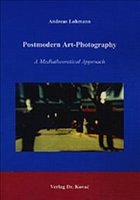This book provides a philosophical and media-theoretical enquiry about postmodern art-photography in the context of our current visual episteme. The aim of my argumentation is to show in what way both spheres are inextricably connected and influenced by each other. The theoretical tools for analysing contemporary photography are mainly drawn from French poststructuralism, psychoanalysis and feminism which have become standard features in cultural criticism and media studies. However, it seems important to pay attention to the question to what extent the theory (i.e. language) can explain the visual (i.e. photographic images), and vice versa how the visual takes effect on our language, e.g. as the light-metaphoric of reason.
Part one of the book contains an analysis of the writings of Jacques Lacan, Jacques Derrida and Michel Foucault, regarding their relevance for a 'theory' of visuality. Part two is dedicated to feminist theories, with special consideration of the much debated issue of pornography. Pornography is such an important battleground for the different strands of feminism because, for some, it represents patriarchal domination and abusive sexism whereas for others, it means freedom of speech and the right to control one's own fantasies.
Part three contains a close reading of Roland Barthes' famous text on photography Camera Lucida. To understand the deeper meaning of this fragmentary and 'unscientific' text it needs to be put in context with his former structuralist phase. Much contemporary photo-criticism uses certain elements from Camera Lucida without considering that it is not a photo theory as such. For them certain of his ideas have become standard jargon even though in Barthes' text they are transient and ambiguous concepts.
In part four I put the discussed theoretical concepts in context with some contemporary art-photographers. The aim is to present a broad variety of different photographic aesthetics which all relate to the current visual episteme. This, then, is the point where it makes sense to speak of a heuristic value of the discussed theory for an understanding of contemporary art-photography.
Part one of the book contains an analysis of the writings of Jacques Lacan, Jacques Derrida and Michel Foucault, regarding their relevance for a 'theory' of visuality. Part two is dedicated to feminist theories, with special consideration of the much debated issue of pornography. Pornography is such an important battleground for the different strands of feminism because, for some, it represents patriarchal domination and abusive sexism whereas for others, it means freedom of speech and the right to control one's own fantasies.
Part three contains a close reading of Roland Barthes' famous text on photography Camera Lucida. To understand the deeper meaning of this fragmentary and 'unscientific' text it needs to be put in context with his former structuralist phase. Much contemporary photo-criticism uses certain elements from Camera Lucida without considering that it is not a photo theory as such. For them certain of his ideas have become standard jargon even though in Barthes' text they are transient and ambiguous concepts.
In part four I put the discussed theoretical concepts in context with some contemporary art-photographers. The aim is to present a broad variety of different photographic aesthetics which all relate to the current visual episteme. This, then, is the point where it makes sense to speak of a heuristic value of the discussed theory for an understanding of contemporary art-photography.

